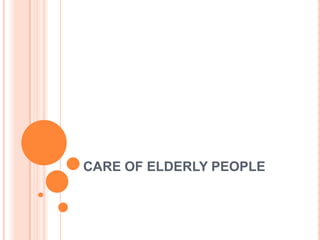
Care of elderly people
- 1. CARE OF ELDERLY PEOPLE
- 2. NEEDS ASSESSMENT Elderly people have the right to have their needs assessed when they may be having difficulties coping and looking after themselves. Carried out by a social worker during a home visit. Assess living conditions – housing and environment, cleanliness Assess independent living skills – able to cook or have adequate nutrition, standard of personal hygiene, level of mobility Assess financial situation – enough income Assess family situation – any informal carers to help
- 3. Will ask questions of the client and family and also use observation. May ask the client to perform simple tasks and observe how well they can do these, e.g. Going upstairs, making a cup of tea. Social worker can make recommendations of services needed by the person.
- 4. Access to needs assessment is by: Self referral – but more commonly third party via a relative or friend who will contact social services department Professional referral – for example, by a hospital social worker when the patient is ready for discharge or GP or district nurse
- 5. DOMICILIARY (HOME) CARE Care provided for clients in their own homes. Home care worker visits client once or twice a day to help with tasks such as: Helping them get up and dressed in the morning or undressed and go to bed at night May do some housework and prepare meals May do shopping Home care (domiciliary) care workers may provide the client with social contact and stimulation as they may be the only people the client sees during the day. Access would be by recommendation from needs assessment
- 6. Advantage is that the elderly person can remain in their own homes longer and maintain their independence.
- 7. DAY CENTRES People can visit once or twice a week to spend the day there. Transport may be provided there and back – often by community transport scheme Activities provided such as crafts, singing and reminiscence sessions, bingo, exercise sessions and so on. Meals are provided and in some cases the client may be assisted to have a bath or shower One member of staff will usually be a trained nurse so will be able to monitor health.
- 8. What physical and psychological life quality factors can be provided by this service?
- 9. Day centres can be provided by local authorities and voluntary organisations such as Age UK (used to be Age Concern). Access to a day centre can be by: Self or third party referral – client or relative makes a request for cay care May be professional recommendation by a social worker
- 10. RESIDENTIAL HOMES Provide: Long term accommodation for those elderly people who are unable to live in their own homes 24 hour care Residents have own bedroom with some personal effects – usually have own toilet and bathroom attached Provide meals and laundry service Day rooms where residents can meet other residents, watch TV or join in other activities
- 11. Help is given as needed with: Bathing Toileting Getting dressed Going to bed Hairdressers. Chiropodists, GPS and opticians sometimes provide services within the home Staff are usually health care assistants, and sometimes there are qualified nurses on duty Staff usually give out medication though some clients can do this for themselves
- 12. Each room is provided with an alarm system so that the client can call for assistance if required Rooms are personalised with small items of furniture, photographs and so on Usually a family atmosphere and family members are encouraged to visit. Birthdays are celebrated Some residential homes are provided by local authorities but most are now privately run and privately funded Some are run by voluntary, not-for-profit organisations such as retired servicemen’s homes
- 13. In all homes, some residents are supported by local authority social service budgets whilst some people pay all the fees themselves if they have more money NURSING HOMES – provide all the services provided by residential homes but they specialise in residents who have greater health problems. Examples may be people who have had strokes or who are severely disabled or who have terminal illnesses. To provide there are more qualified nursing staff employed
- 14. Nursing homes charge higher fees than residential homes to cover the cost of the more specialised care provided. Access to residential and nursing homes depends on who is paying the fees: For those people who pay their own fees access is by applying directly to the home For those people who will be funded by social services, access is by a needs assessment carried out by a social worker.
- 15. Summary of main types of service provision for elderly people: Needs assessment Domiciliary care Day centres Residential care homes Nursing homes